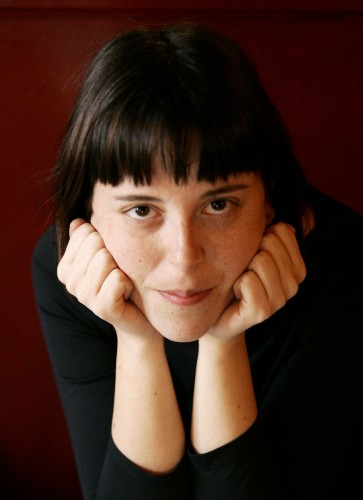The writer and translator Pilar Adón was born in Madrid in 1971. Her literary career started at a quite early age, and she published her first novel in 1999. Later, in 2003 se published the novel Las hijas de Sara (Sara’s Daughters) at Alianza Editorial, and later (2007) this work was published in paperback by Editorial Puzzle. Las hijas de Sara was considered by Revista Lateral one of the ten best novels of 2003. Her tales have been included in several volumes of short stories, and she has published stories and poetry in various magazines and literary supplements (Babelia-El País, ABC, Público…). At present, Pilar Adón translates form English into Spanish works of fiction and essays (Henry James, Edith Wharton, Christina Rossetti, Joan Lindsay, Penelope Fitzgerald…)
As a poet, she has published several collections: in 2011 La hija del cazador (The Hunter’s Daughter) at La Bella Varsovia, and in 2006 Con nubes y animales y fantasmas (With Clouds and Animals and Ghosts) at EH Editores. Her poems have been compiled in several volumes: Los jueves poéticos (Ediciones Hiperión, 2007) and La voz y la escritura (Sial Ediciones, 2006).
In 2005 she was awarded with the prestigious Premio Ojo Crítico, of Radio Nacional de España (RNE) for her book of stories Viajes inocentes (Innocent Journeys), published by Páginas de Espuma. Her latest book of stories, El mes más cruel (The cruellest month), has been awarded with the Prize Nuevo Talento Fnac in 2010, and has been acclaimed by both the critic and the readers as one of the best books of the year. In fact, El mes más cruel has been shortlisted for prestigious Tigre Juan Award, which points out the best book published during the year, and the prize Setenil to the best book of stories of the previous year.
The stories of Pilar Adón have been translated into French, German, Serbian and Korean.
How would you define yourself?
Perfectionist, hard worker, persevering and home loving.
What can the audience expect from your collaboration with Spain NOW!?
A visual and intimate poem that evokes the willingness to run away and be somewhere else and, at the same time, to stay at home and be there where you’ve always been: safe and in a very comfortable environment. Sven stays in Antarctica, and to the “narrator” of the poem, who is there with him, the situation is ambivalent: desirable sometimes; horrible others.
What do you think your collaboration with Spain NOW! will bring for you?
It has already brought very delightful and friendly moments. Not only because of the creative process itself, but because of the possibility of meeting and emailing really fantastic and gentle people. Everything’s been calm, perfect and nice, and I’m very happy with the results. That’s something that I cannot always say.
Describe or give us some insights about your creative process.
For me, writing is basically a question of being sat in front of my computer and try to express what I want to say because of my previous readings or feelings or obsessions. And that’s what I do: I spend most of my days sat in a room where I keep my books and pictures and plants, and write and rewrite. I know this may be not very explicative, but to me there is no more technique than this: I need a first phrase, a story to tell, some sensations I want readers to feel, and that’s it. Words are the instruments to achieve all these ambitions.
What can you say about the current state of Spanish culture within your field? What other emergent Spanish artists can you recommend for those who enjoy your work?
It’s diverse, multiple and heterogeneous. I think that the main similarity among us right now is the dissimilarity. The influences most of us have received come from beyond Spanish boundaries, so our gallery of favorite authors are usually not Spaniards themselves. That’s something we have in common. But those influences have made different impressions on us, and some have tried to put them into a typical urban scene, others into a more rural one; some choose very young characters whose experiences are those of today people, and some prefer to get away from here and focus on distant matters. Other writers of my age are, for instance, Mercedes Cebrián, Marta Sanz, or Oscar Esquivias.
Define your work (either in general or your collaboration with Spain Now) in a sentence…
What I try to achive is to express the most tortuous, deep and tender part of human behaviour.
Define yourself as:
- a “saying”: One can never know too much
- a geographical accident: A valley
- an animal/mineral/plant: A rabbit; A white stone; Bracken
- a dish/food: Cheese
- a London Underground station: Kew Gardens

